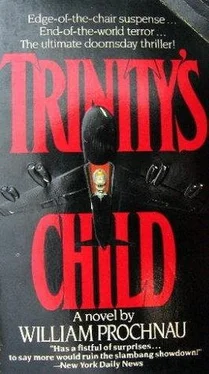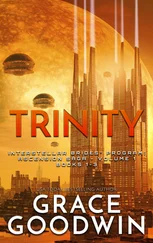Harpoon shot an amazed glance across the compartment. “Jeezuz, colonel,” he rasped. “New York? In the middle of the night? With no electricity?”
“Just as we should assume the Soviets are evacuating their cities, rapidly and efficiently,” the colonel continued undaunted.
Grunts emerged from the generals. The successor seemed to miss the entire exchange. “But it wasn’t hit…” his dull voice interrupted the grunts. “Why?”
“New York is a hostage city, sir,” Harpoon answered simply. “The blue cities are being held hostage.”
“Hostage?” The voice went from dull and disbelieving to incredulous.
“Sir, American cities are being held hostage and Soviet cities are being held hostage. That is the system we built. We are holding each other mutually hostage, just as we were before the war. We left Leningrad, holding it hostage. We are saying to them: You take New York and we will take Leningrad. In the second strike. Or the third strike.”
“Leningrad is standing?” The voice turned guttural. He had not yet focused on the map of the Soviet Union. “Four hours after a sneak attack on the United States, we have left Leningrad”—the voice broke in anger and dismay—“untouched?”
“That is the system, sir.” Harpoon swore under his breath. He was sounding like a damned New England schoolmaster. But he didn’t know how else to answer.
The successor’s eyes darted past Harpoon to the map of the Soviet Union. Across the top of the Eurasian continent, the same mix of red and blue dotted the landmass. He had fewer reference points in a land he had never visited, but the middle of the continent, from east to west along the Trans-Siberian Railway line, was a long red string where the main missile fields had been. Red staibursts blossomed out of Kamchatka and the Arctic coast near Murmansk, which he assumed were submarine bases. He knew from Cabinet meetings that Plesetsk and Tyuratam were missile-and satellite-launching centers.
They were red. So were Vladivostok and Odessa, as promised, as well as Sverdlovsk, Tbilisi, and a handful of other major Soviet cities. Moscow was dotted in red, but blue interrupted the blood color. Leningrad, Minsk, Smolensk, Riga, and other metropolitan areas remained blue.
The successor moved his eyes away from the map and toward Harpoon. Shakily, he started to rise, clattering the Seal to the floor. He sat back down. His face was ghostly white and his mouth moved several times before the words came out. ‘Treason…” he muttered grotesquely. “Ungodly… insane…” The words trailed off.
Harpoon felt the plane tilt slightly as the pilot maneuvered in the random pattern of evasion he had been taught. Around the briefing table, the officers swayed with the aircraft, eyes cast downward, light coughs interrupting the rhythmic silence of the moment. Only the colonel, outranked by all but here because he was the command plane’s expert in Soviet thinking, nodded almost imperceptibly.
Harpoon floundered. He looked at his watch. Damn. “Insane, perhaps,” he said wearily. “Ungodly, for sure. But not treason. It is the system we built to protect ourselves. It is the system the Soviets built to protect themselves.” He paused very briefly. “It isn’t working very well.”
“Isn’t working very well,” the successor repeated in a drone. His mind was weaving with the aircraft. “Loco,” he said, the word momentarily jelling his thoughts. He spat the next words: “We runnin’ this war from some ward at St. Elizabeth’s, Harpoon?”
Harpoon sagged, then drew himself up again. “Sir,” he said plaintively, “it is crucial that you quickly learn the system so you have some chance of dealing with it. If all of America is destroyed, the Soviets have no hostages and we have nothing to protect. The Soviets don’t want that. If all the Soviet Union is destroyed, we have no hostages and they have nothing to protect. We can’t possibly want that. Then there is no reason to stop. Ever.”
“Stop,” the successor repeated.
Harpoon watched the man closely. He had watched men go crazy dealing with this in peacetime.
“Who started this, Harpoon?” he asked.
Damn. There’s no time for this crap. “The Soviets, sir.”
“How long ago?”
“Four hours. Almost precisely 0600 Zulu.” Harpoon felt his fears tum to exasperation. “That’s Greenwich mean time, sir. One a.m. in Washington. Midnight in Omaha.”
“Winter morning in Moscow. Dark.” The successor’s words were detached. “Out of darkness. Into darkness.” His eyes drifted, too.
Now Harpoon felt woozy. Out of darkness, into darkness? Was he quoting from the Bible? He struggled through misty childhood memories of Revelation and Matthew and John. He shook his head.
“Wintertime,” the colonel intoned seriously. “A time when the Russian psyche is its darkest, its most depressed, its most paranoid. They are so preoccupied with the cold darkness of their long winters that Russian authors have written novels about the theft of an overcoat. Tells you a lot.” Harpoon looked at him in amazement. The colonel paused and then intoned seriously, “It also tells us that if those people were paranoid enough to start this, they are paranoid enough to go down to the last missile.”
The admiral stared at the Librarian. You little prick. Spent your whole life burrowing through Russian papers looking for the most belligerent statements to use as ammunition. Then Harpoon cursed himself again. They had all used men like that, kept them around to pry more money out of Congress. Just as the Russians had kept men busy collecting the rashest of the American statements, crap from the John Birch Society, nutty statements from half-baked right-wing congressmen with no more influence than Jerry Falwell. Damn. Harpoon continued to stare at the colonel, but he wasn’t sure whom he was damning most. The colonel stared back.
Harpoon shook his head once more and turned toward the successor. The man’s face was gone again. He felt like he was wrestling with Jell-O. Harpoon tried to fight down the wisp of a memory, the kind he had successfully suppressed during the total involvement of the past four hours. His eleven-year-old grandson pulled at his sleeve, tugging him back into playfulness after one of those periodic lapses far off into his SIOP world. Earth to Gramps, the boy said. Come in, Gramps. The admiral’s grandson had been in Seattle. He winced. The admiral fought back the memory. Earth to the President. “Sir, can we please get on with this?”
The successor saw the wince. “I see no point,” he said.
“No point?”
“I want our remaining ICBM’s fired at the blue circles immediately.”
“Sir, please…”
Even the colonel was shaking his head now, and a pang of fear flashed through Harpoon. The Librarian had no respect for this man at all. For years the colonel had been the used. Now he was going to be the user.
“Fire them,” the successor said.
“All our ICBM’s were launched or destroyed hours ago,” Harpoon fumbled.
“Why don’t you just get to the point, admiral?” The colonel cut in.
“Because he needs to know what is at stake, dammit!” Harpoon flared.
“At stake?” the colonel bored on. “We were attacked. The sovereignty of the United States is at stake. We can give up, or we can use the bombers. To cut the head off the chicken.”
“Shut up, colonel,” Harpoon said flatly. They were talking as if the successor had left the compartment. But the successor was not listening anyway, tracking on his own course now.
“Precisely how many Americans are dead?” the man interrupted.
“Twenty to thirty million,” Harpoon said, swiveling his glare away from the colonel and into the blank face. “More will die from radiation, riots, disorder. Maybe forty million total. If we can stop now.”
Читать дальше












